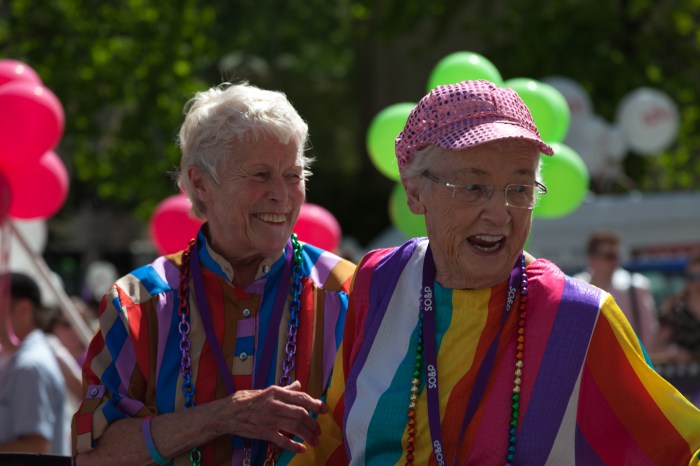Responding to a determined push by advocates and Democratic leaders in Trenton for a marriage equality law, New Jersey Governor Chris Christie emphatically stated he plans a veto.
Telling reporters, “I made this opinion really clear when I was running for office in 2009,” the Republican governor, on January 24, charged that Democrats are treating “hundreds of years of societal and religious tradition” like “a political football.”
Christie knows his resistance to gay marriage is increasingly unpopular in the Garden State, so he worked hard to position his call instead for a statewide ballot referendum as a sign of his openness on the issue. Undoubtedly, he felt his nomination the day before of an African-American Republican attorney, Bruce A. Harris, as the State Supreme Court’s first openly gay justice gave him some political berth.
“The fact of the matter is, I think people would have been happy to have a referendum on civil rights rather than fighting and dying in the streets in the South,” the governor argued.
Whatever Harris might think of that statement, the notion that minority rights should be put up to a popular vote runs counter to the values held by leading civil rights leaders — back in the 1960s and today — by Republican leaders from days gone by, and even by the Founding Fathers.
Cory Booker, Newark’s African-American mayor, quickly responded to Christie, saying, “I shudder to think what would have happened if the civil rights gains, heroically established by courageous lawmakers in the 1960s, were instead conveniently left up to popular votes in our 50 states.”
Georgia Congressman John Lewis, a veteran of the ‘60s Civil Rights Movement, appeared in Trenton on January 30, doubling down on Booker’s point: “Apparently the governor of the state has not read his recent history books. We would never have won. The actions of Congress and executive orders brought down those signs that said ‘colored only’ and ‘whites only.’”
Duncan Osborne reports that Lewis accurately reflected the views of his ‘60s allies, quoting a Seattle NAACP official who argued against a 1964 ballot initiative aimed at overturning a nondiscrimination law there: “When you are dealing with rights granted by our Constitution there is no such thing as ‘majority rules.’ The Constitution grants rights to minorities, and the majority should not be able to vote down these rights.”
Osborne also noted that President Dwight Eisenhower, a Republican, and GOP Senate Minority Leader Everett Dirksen agreed civil rights do not make, in Ike’s words, “a very good subject for a referendum.” Dirksen stated, “I’m not going to pass the buck to the people back home and say, ‘I’m thinking about the next election.’ And they would say, ‘Haven’t you got any guts to stand up under the Constitution of the United States?’”
In fact, America’s tradition of protecting minority rights against the tyranny of the majority is deeply rooted in late 18th century constitutional thinking. James Madison, in “The Federalist Papers, No. 51,” wrote, “It is of great importance in a republic not only to guard the society against the oppression of its rulers, but to guard one part of the society against the injustice of the other part… In a society under the forms of which the stronger faction can readily unite and oppress the weaker, anarchy may as truly be said to reign as in a state of nature, where the weaker individual is not secured against the violence of the stronger.”
Preventing the “violence” of the majority has become a very costly proposition for the LGBT community. In 29 states, voters have gone to the ballot box to amend their constitutions to specifically bar same-sex couples from marrying. According to Equality California, more than $43 million was spent in the unsuccessful effort to defeat Proposition 8 — and that’s before a very expensive legal battle to challenge its constitutionality in federal court began.
While the Census Bureau estimates California’s population at 37.7 million and New Jersey’s at only 8.8 million, buying ads in the New York and Philadelphia media markets means it is no bargain to reach Garden State voters. And, with anti-gay forces pushing marriage amendments in North Carolina and Minnesota this year, Fred Sainz, a spokesman for the Human Rights Campaign, said, “I wouldn’t place a bet that our side would be able to fund the referendum” in New Jersey at the level required to win.
The most salient question is: Why should we have to? Our community has been forced to defend our rights at the ballot box 31 times — and that’s just on the issue of marriage — a burden that represents a hidden tax on every LGBT American.
Republicans say they are the party of lower taxes, and yet, over and over again, key figures in the GOP have launched insidious efforts to deny us our rightful place in society by dragging us into costly election-year battles.
Christie is spinning fast to put a friendlier, let’s-see-what-the-people-say face on his referendum proposal, but it amounts to the same thing. Anti-gay forces and their Republican friends have for too long had their hands in our pockets — and it’s time to demand they remove them.


































